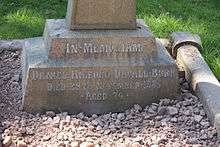Daniel Higford Davall Burr
| Daniel Higford Davall Burr MP JP DL | |
|---|---|
 Burr's grave at the Church of St Mary the Virgin, Aldermaston | |
| Born | Daniel Higford Davall Burr |
| Died |
29 November 1885 (aged 74) Aldermaston, Berkshire |
| Resting place | Church of St Mary the Virgin, Aldermaston |
| Residence | Aldermaston Court |
| Occupation | Member of Parliament |
| Title | Lord of the Manor of Aldermaston |
| Term | 1849–1885 |
| Predecessor | Daniel Higford Davall Burr |
| Spouse(s) | Anne-Margaretta Scobell |
| Children | 3 |
| Parent(s) | Daniel Burr and Mary Davis |
| Relatives |
James Davis (maternal grandfather) Charles Howard, 11th Duke of Norfolk (maternal great-grandfather) |
Daniel Higford Davall Burr JP DL (24 March 1811 – 29 November 1885) was a British Member of Parliament and Justice of the Peace.[1]
Biography
Burr was born to Daniel Burr (a lieutenant colonel with the East India Company) and Mary Davis. His maternal grandfather was James Davis. His maternal lineage also included Charles Howard, 11th Duke of Norfolk.[1]
On 1 February 1836, Burr's mother died[1] and he inherited the estate of Alvington, Gloucestershire.[2] The following year, he became Conservative Member of Parliament for Hereford, a position he held for four years.[1]
In 1849, Burr purchased Aldermaston Court, a country estate in Aldermaston, Berkshire, that had been destroyed by fire six years previously.[3] He commissioned Philip Charles Hardwick to build a neoclassical mansion. Burr was an eccentric, and owned monkeys and snakes. His monkey was known to climb the maypole on the village green.[4]
In 1851, Burr became High Sheriff of Berkshire.[1]
Personal life
Burr married Anne-Margaretta Scobell, an amateur watercolour artist, on 18 September 1839 at St Marylebone Parish Church.[5] They had three sons – Higford (born 20 July 1840), Edward (born 25 September 1842), and James-Scudamore (born 15 January 1854).[1]
Burr died on 29 November 1885. The Aldermaston estate was occupied by his son Higford for a short while, before he sold it to Charles Edward Keyser in 1893.
Burr's family's coat of arms included a golden rampant lion, with a crest enscribed with "Ternate" – the Indonesian Maluku Island captured by his father in 1801.[1][6] The family's motto was versus veras honos – literally "virtue, truth, honour".[1]
See also
References
- 1 2 3 4 5 6 7 8 Burke, Bernard (1858). A genealogical and heraldic dictionary of the landed gentry of Great Britain and Ireland. 1. London: Harrison. p. 159.
- ↑ Currie, CRJ; Herbert, NM, eds. (1996). "Alvington: Bledisloe Hundred, St. Briavels Hundred, The Forest of Dean". A History of the County of Gloucester. 5. pp. 5–14.
- ↑ "Aldermaston – A Brief History" (PDF). Aldermaston Parish Council. 7 June 2007. Retrieved 4 March 2010.
- ↑ Timmins, Gordon (2000). Aldermaston: A Village History. Winchester, Hampshire: Hampshire County Council.
- ↑ White, William (1910). Notes and Queries. 122. Oxford, Oxfordshire: Oxford University Press. p. 350.
- ↑ Burke, Bernard (1864). The General Armory of England, Scotland, Ireland, and Wales: Comprising a Registry of Armorial Bearings from the Earliest to the Present Time. London: Harrison. p. 149.
Further reading
- Burr Todd, Charles (1902). A General History of the Burr Family: With a Genealogical Record from 1193 to 1902. New Rochelle, NY: Knickerbocker Press.
| Parliament of the United Kingdom | ||
|---|---|---|
| Preceded by Edward Clive Robert Biddulph |
Member of Parliament for Hereford 1837–1841 With: Edward Clive |
Succeeded by Edward Clive Henry William Hobhouse |
| Honorary titles | ||
| Preceded by Robert Allfrey |
High Sheriff of Berkshire 1851 |
Succeeded by John Samuel Bowles |